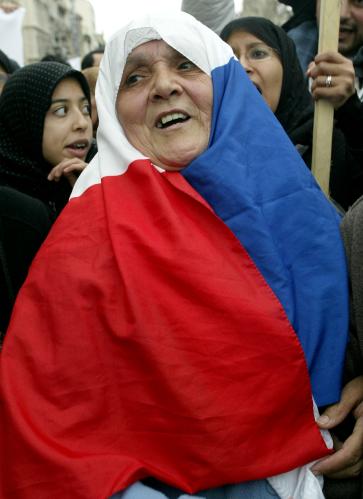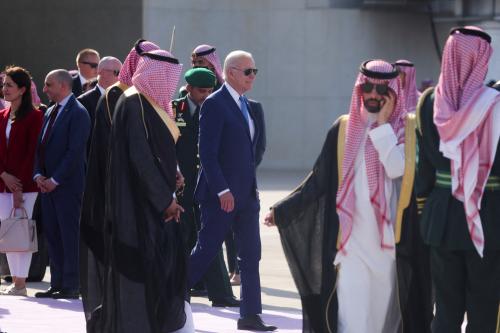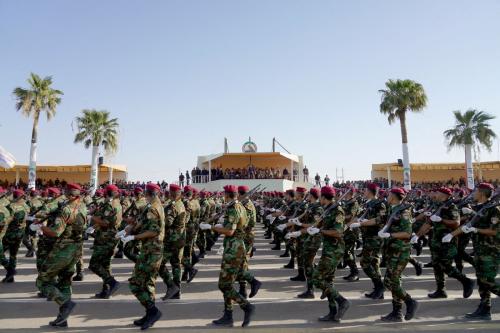Editor’s Note: In an
interview with NPR’s Charles Hawley
, Jonathan Laurence discusses Muslim integration in Germany along with its implication of increasing cultural tensions.
Charles Hawley: Primarily I know that you’re mostly focused on immigration, Muslims in Europe. The debate in Germany I find to be somewhat unique, in Bonn a small party of anti-Islamist populists decided in their campaign for the state elections to display Mohammad caricatures in front of Muslim facilities and they engendered a response that was perhaps not surprising, but was nonetheless unfortunate, when Salafists attacked the police protecting the small demonstration. How is it that such a small tiny group could define the debate about Islam in the German press for months?
Jonathan Laurence: Well there are two tiny groups in that case that are defining the German debate rather unhelpfully at the same time. And each has its own place of primacy even though they’re really quite small. (Unintelligible) has its most recent experience in the public realm as the prime mover behind a campaign against the construction of a grand mosque in Cologne’s city center. Which is not far from the main cathedral. And their plan to build a Mosque in central Cologne inspired this small coalition of self-anointed anti-Islamization prophets basically who view any sign of permanence of Islam in Germany or in neighboring countries to be a real challenge to the country’s fundamental identity. So out of really very small numbers, they were able to mount this very visible campaign against the construction of the mosque and this lead to some real significant clashes. That fact brought out I think some of the worst in the Muslim origin population in that the mainstream organizations which are basically all of them said that if you don’t want us to have a transparent visible proper mosque in the city center, then why do you criticize the prayer spaces that we have that are in the second courtyard. We’re just trying to make ourselves at home here. And so the (unintelligible) movement has its roots in this and wound up provoking this Salafist fringe within the organized Muslim community, which is really tiny, we’re talking in the low thousands for the entire country.
Hawley: You spoke also of the fact that the (Unintelligble) is interested in maintaining the identity of that region of Germany as a whole. When talking to them of course, they also emphasize or they primarily emphasize that they are there to defend democracy. Is that an honest argument on their part?
Laurence: Not entirely, if you allow that this democracy with its constitution upholds religious freedom. And what they are objecting to within Islamic organizations within Germany is more a result of Islam not having found analogous institutional structures to the churches or synagogues and other religious communities that have been here for a while. The German constitution, the Grundgesetz, took over from the Weimar constitution a whole section concerning religious freedoms, allowing for religious communities to be formed, allowing for religious communities to be recognized as public law corporations, and to enjoy certain privileges. So to teach in public schools an hour of religion each week, to collect some funds, revenue, church taxes for the running of the community, to have seats on the boards of certain public broadcasting corporations. There’s a whole range of privileges, which Muslims now that they are becoming more and more part of the citizenry are asking for access to quite naturally. So the idea that preventing them from exercising their constitutional rights is a defense of democracy is somewhat disingenuous. But what they are objecting to in the (Unintelligible) circles are the radical fringes of the religion.
Hawley: What is it about that political background that makes Germany prone to these periodic orgies of angst?
Laurence: Well Germany has this funny experience of dual dictatorship in the 20th century, which has really conditioned the way that citizens experience democracy. The West German Federal Republic was already quite constrained in its international degrees of freedom because of its anchoring in NATO, but also because of the American occupation. And then of course the Soviet occupation, which wound up taking the form of East German Democratic Republic, extended also an experience of essentially totalitarianism from the Nazi period of the Third Reich. And so I think that those two experiences of dictatorship as perceived from the West led to a whole series of restrictions on how far freedoms should be allowed to go because of the risk of their spilling over into intolerance. And so a kind of anti-fascist broadly speaking mentality of no freedom for the enemies of freedom developed. And of course to have activities on the politically extreme is perfectly natural in Western democracy, it’s not possible that the parliamentary party system covers everyone. And if you have freedom of opinion, then you have to expect that there are going to be some people out there with really nasty opinions. But it’s very hard for I think Germans to feel quite responsible for those experiences of dictatorship and ensuring that they never occur again. So it’s often coming from a kind of well-intentioned place. When they want to prevent the spread of Islamism, that’s not just pulling out, that’s Germany government policy essentially. They don’t speak to groups that define themselves as Islamist even if they’re nonviolent. So the aims of that are perfectly understandable, they don’t want to come to a situation where there is a religious theocracy.



Commentary
Muslim Integration in Germany
November 28, 2012